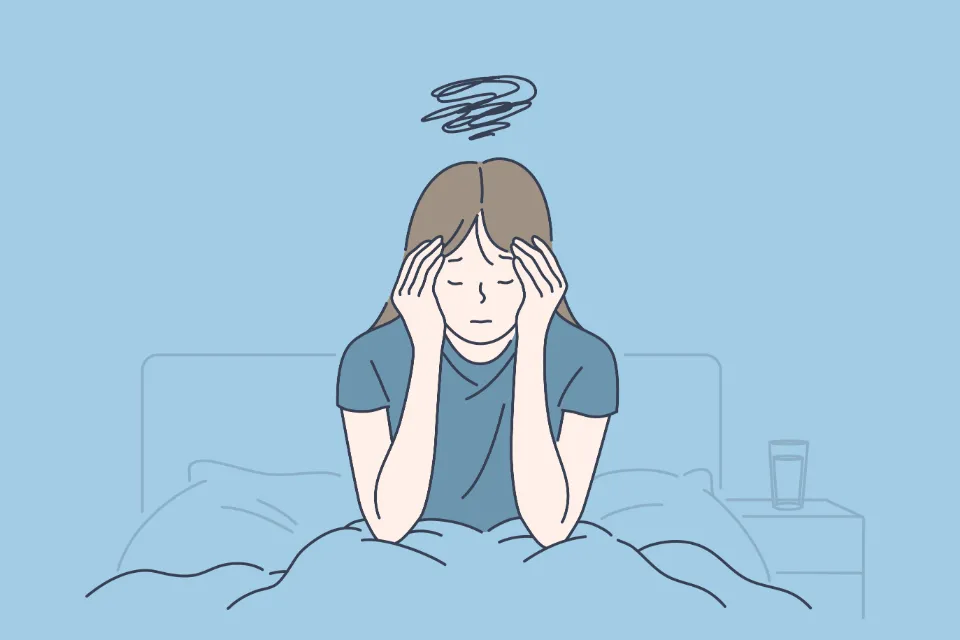
How to Stop Overthinking? Read the Ultimate Guide
It’s always a good idea to think things over before you speak, but doing so too much can make you ineffective or cause you to experience uncontrollable anxiety. Are you looking for “how to stop overthinking”?
In general, you are supposed to notice when you’re stuck in your head, keep the focus on problem-solving, challenge your thoughts, find a distraction, schedule time for reflection, and acknowledge your successes…
Below will tell you the definition, signs, and causes of overthinking. Keep reading.
Table of Contents
What is Overthinking?
Overthinking involves thinking about a certain topic or situation excessively, analyzing it for long periods of time. When you overthink, you have a hard time getting your mind to focus on anything else. One thing you are thinking about completely consumes it.
The opposite is true, despite the belief of some that overthinking may be beneficial because it entails considering a situation or issue from nearly all angles and imagining potential outcomes. Research suggests that overthinking is associated with feelings of depression, anxiety, and post-traumatic stress disorder (PTSD).
We all occasionally overthink things. It’s possible that you’ve spent countless hours trying to decide what to wear to your upcoming job interview or that you constantly worry about all the things that could go wrong when you deliver your presentation next week.
By taking action in your life rather than just thinking about your problems, you can find ways to stop overthinking. You can begin to take the actions required to resolve the situation rather than continually going over the issue in your mind.

Destructive Thought Patterns
Ruminating and constant worrying are two destructive thought patterns that are frequently present in overthinking.
Ruminating entails reflecting on the past. Thoughts may include things like:
- I shouldn’t have said those things during the meeting yesterday. Everyone must think I’m an idiot.
- I should have stayed at my last job. I would be more content than I am right now.
- I didn’t learn how to be self-assured from my parents. My fears have held me back my entire life.
Consistent worry involves pessimistic—often disastrous—prognoses for the future. Thoughts may include things like:
- Tomorrow when I deliver that presentation, I’m going to look terrible. I’m sure I’ll forget all the things I need to say.
- Others will advance ahead of me in the promotion chain.
- We’ll never have enough money, I’m certain of it. We’ll become too ill to work, and we’ll become broke.
It can be difficult to break your negative thought patterns, just like it is with any habit. You can change how your brain thinks, though, with regular practice.
How to Stop Overthinking?
Here are the details:
Notice When You’re Stuck in Your Head
Overthinking may become ingrained to the point where you are unaware of it. Start observing your thought processes to become conscious of the issue.
Recognize that it is counterproductive to keep thinking about past events or to worry about variables you are unable to control. Only when thinking results in constructive action is it useful.
Keep the Focus on Problem-Solving
Finding solutions is more beneficial than dwelling on your issues. If it’s something you can influence, think about how you can prevent the issue or set a goal for yourself to come up with five potential solutions.
Think about coping mechanisms you can employ if it’s a situation over which you have no control, such as a natural disaster. Think about the aspects you can influence, such as your attitude and effort.
Challenge Your Thoughts
With negative thoughts, it’s simple to spiral out of control. Therefore, acknowledge that your thoughts may be overly negative before you assume that missing one deadline will result in you losing your housing or that taking a sick day will result in you being fired.
Always keep in mind that emotions will make it difficult for you to view situations objectively. View the evidence objectively and step back. What proof do you have that your idea is accurate? What evidence do you have that your thought isn’t true?
Find a Distraction
Engage in something you enjoy to stop yourself from overthinking.
This looks different for everyone, but ideas include:
- learning some new kitchen skills by tackling a new recipe
- going to your favorite workout class
- taking up a new hobby, such as painting
- volunteering with a local organization
Schedule Time for Reflection
Long-term problem-solving is counterproductive, but quick reflection can be beneficial. Thinking about how you could do things differently or recognizing potential pitfalls to your plan could help you perform better in the future.
Incorporate 20 minutes of “thinking time” into your daily schedule. Allow yourself to worry, ruminate, or contemplate anything you want during that time.
When your time is up, move on to something else. And, when you start overthinking things outside of your scheduled time, simply remind yourself that you’ll need to wait until your “thinking time” to address those issues in your mind.

Acknowledge Your Successes
When you’re in the midst of overthinking, stop and take out your notebook or your favorite note-taking app on your phone. Jot down five things that have gone right over the past week and your role in them.
These don’t need to be huge accomplishments. You might have cleaned out your car or stuck to your weekly coffee budget. You might be surprised at how these little things add up when you see it on paper or on a screen.
If it feels useful, return to this list whenever you notice your thoughts getting off track.
Learn Mindfulness Skills
When you’re in the moment, it’s impossible to dwell on the past or anticipate the future. Mindfulness will help you become more aware of the here and now.
As with any skill, mindfulness requires practice, but with time it can help reduce overthinking. You can acquire mindfulness techniques with the aid of courses, books, apps, videos, and classes.
Change the Channel
It is counterproductive to tell yourself to stop thinking about something. The more you fight a thought from coming into your head, the more likely it is to keep doing so.
By changing your behavior, you can change the channel in your brain. Work on a distracting project, go for a walk, or have a conversation about something completely unrelated. The onslaught of unfavorable thoughts can be stopped by making a change.
Do Something Nice for Someone Else
Attempting to lighten someone else’s load can assist you in gaining perspective. Try to come up with ways you can help someone who is struggling.
Does your friend who is going through a divorce require some child care for the afternoon? Can you get your sick neighbor’s groceries for him or her?
Negative thoughts can be prevented from taking control by being aware of your ability to improve someone’s day. It also gives you something productive to focus on instead of your never-ending stream of thoughts.
Take Action
When you don’t make any decisions regarding a situation, you might find yourself thinking about the same things over and over again.
A person you envy is on your mind nonstop? Let your emotions guide you to better decisions rather than letting it ruin your day.
Be proactive and make a list of how you can go about achieving your goals before the next time the green-eyed monster comes calling. This will help you escape your thoughts and focus your energy on taking meaningful action.
Train Your Brain
Paying attention to the way you think can help you become more aware of your bad mental habits. You can change the way your brain thinks with practice. Over time, building healthier habits will help you build the mental muscle you need to become mentally stronger.

Practice Self-compassion
You can’t let go when you think about your past transgressions. If you find yourself criticizing something you did last week, try shifting your attention to self-compassion.
Here are some ways to get you started:
- Write down a worrying thought.
- Keep an eye out for any arising feelings and physical reactions.
- Acknowledge that your feelings are true for you in the moment.
- Adopt a phrase that speaks to you, such as “May I accept myself as I am” or “I am enough.”
Embrace Your Fears
You can never fully control everything. It can be very helpful to stop overthinking if you can learn to accept this. According to a study, embracing unfavorable thoughts and anxieties can benefit psychological wellbeing.
Of course, it’s easier said than done, and it won’t happen overnight. However, look for small chances where you can deal with the circumstances you frequently worry about. You could take that solo day trip you’ve been wanting to go on or stand up to a bossy coworker.
Signs You’re Overthinking
If you’re wondering whether you are overthinking a particular situation or concern, there are a few things you can look for. Signs of overthinking include:
- An inability to think about anything else
- Being unable to relax
- Constantly feeling worried or anxious
- Fixating on things outside of your control
- Feeling mentally exhausted
- Having a lot of negative thoughts
- Replaying a situation or experience in your mind
- Second-guessing your decisions
- Thinking of all the worst-case scenarios
Causes of Overthinking
There are many reasons why people overthink. Here are a few to think about.
Not Being Solution-Focused
Problem-solving is different from overthinking. While problem-solving entails looking for a solution, overthinking focuses on the issue at hand.
Imagine a storm is approaching. Here’s the difference between overthinking and problem-solving:
- Overthinking:“I hope the storm never arrives. The outcome will be terrible. I’m hoping there won’t be any damage to the house. Why do these things always have to happen to me? I can’t handle this.”
- Problem-solving:“I’ll go outside and gather up anything that might blow away. In an effort to prevent flooding, I’ll place sandbags against the garage door. If it rains a lot, I’ll go to the store to get plywood so I can board up the windows.”
Problem-solving can lead to productive action. Instead of seeking solutions, overthinking, on the other hand, feeds unsettling feelings.
Experiencing Repetitive Thoughts
Ruminating—or rehashing the same things over and over again—isn’t helpful. On the other hand, when you overthink something, you might catch yourself mentally replaying a conversation or visualizing a negative scenario repeatedly.
According to a 2013 study published in the Journal of Abnormal Psychology, dwelling on your issues, errors, and shortcomings increases your risk of mental health issues.3
The likelihood that you will ruminate on your thoughts increases as your mental health deteriorates. It’s a vicious cycle that can be difficult to escape.
Your Brain Won’t Shut Off
You may feel as though your brain won’t turn off when you are overthinking. When you try to fall asleep, your brain may even seem to be working overtime as it replays scenarios and makes you imagine bad things happening.
Rumination disrupts sleep, as research supports what you probably already know. Overthinking makes it harder to fall asleep.
Overthinking impairs the quality of your sleep too. Therefore, when your mind is preoccupied with overthinking everything, it is more difficult to fall asleep deeply.
More worrying thoughts could arise if you have trouble falling asleep. You might imagine that you’ll be too tired the next day if you don’t fall asleep right away, for instance. You might become anxious as a result, which could make it even harder for you to fall asleep.

Making Decisions is a Struggle
You may try to persuade yourself that your longer and more deliberate thought processes are beneficial. You are after all considering every angle of the issue. Overthinking and obsessing, however, actually creates a barrier. According to research, making decisions is difficult when thinking too much.
If you’re indecisive about everything from what to eat for dinner to which hotel you should book, you might be overthinking things.
It’s very likely that you are wasting a lot of time looking for second opinions and researching your options when, in the end, those minor decisions might not matter that much.
Decisions Are Second-Guessed
Beating yourself up for previous decisions is a common side effect of overthinking.
You could waste a lot of time wishing you had taken the other job or avoided starting a business in order to improve your life. Or perhaps you become angry with yourself for not recognizing the warning signs sooner because you feel they should have been obvious!
A form of mental torture is rehashing and second-guessing, even though some healthy self-reflection can help you learn from your mistakes.
Your mood may suffer as a result of overanalyzing, and future decision-making may become even more challenging.
Read about
In Closing: How to Stop Overthinking?
In general, you are supposed to notice when you’re stuck in your head, keep the focus on problem-solving, challenge your thoughts, find a distraction, schedule time for reflection, and acknowledge your successes…
Please leave a comment if you have any queries. I appreciate your reading.


